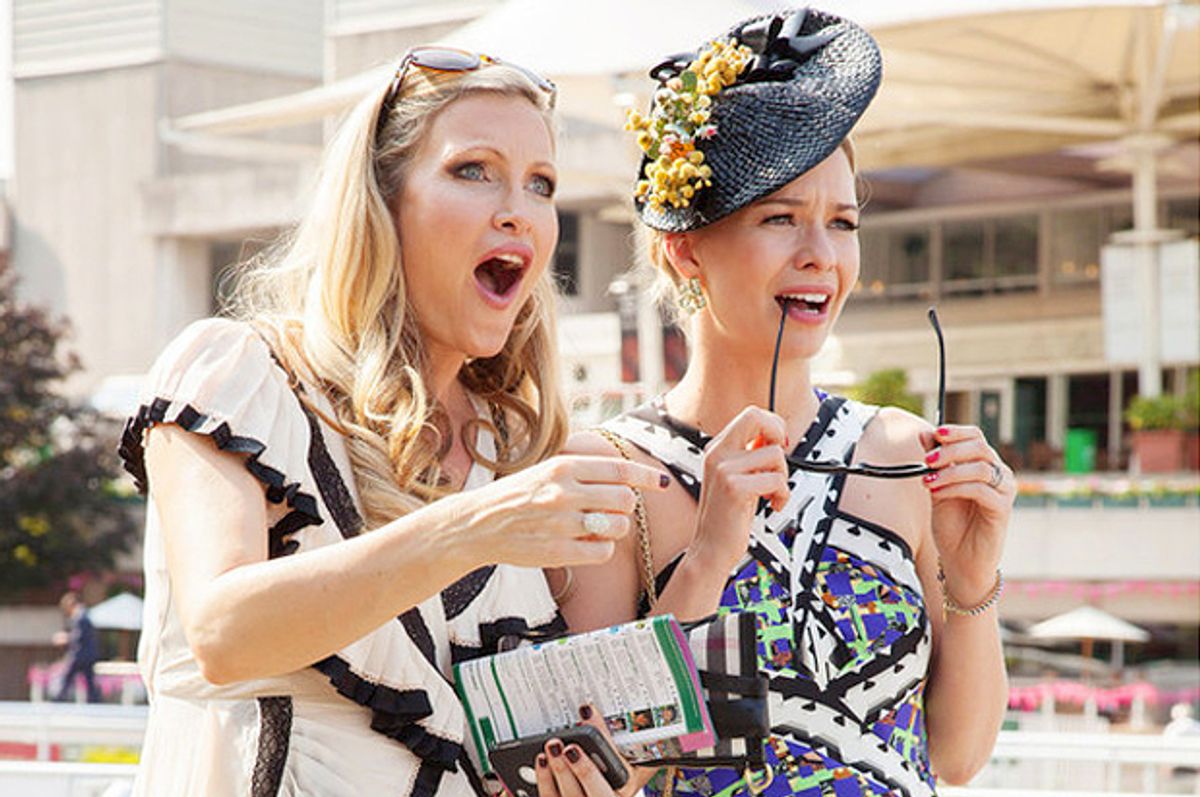Reality TV has been perhaps the greatest leveling force in American culture this century. Celebrities we've perceived as having impossibly glamorous lives, from the Simpson-Lacheys to the Kardashians, open up their beautiful homes and stunningly banal thoughts to us. Season after season, "Survivor" casts famous and wealthy pro-sports figures -- in the most recent season, Miami Marlins president David Samson -- who are promptly voted out by the proletariat. (Samson was booted first; a Jersey City cop ended up winning.) And Bravo's "Real Housewives" open each episode with a carefully chosen catchphrase, but invariably end up drunk and degraded.
Eventually, we were going to run out of American cultural tropes to send up -- and so it is that reality has alighted upon the United Kingdom. Both Fox's just-canceled "I Wanna Marry Harry" and Bravo's new "Ladies of London" tell stories about how the British gentry are, just like us Americans, buffoonish and grasping.
Neither show, to be clear, depicts actual Windsor family members. (The closest to that on TV may be the forthcoming "Almost Royals," on BBC America, whose previews spotlight a pair of ditzy heirs without any of the disdain that Paris Hilton got on the similar-seeming "The Simple Life.") But nor exactly are they shows about status-hungry folks who will never really be royals. "Ladies of London," shot and edited in precisely the same style as "The Real Housewives" franchise, follows six women of varying levels of relation to the real upper crust of British society. One cast member, an American, moved to London years ago and is now married to the owner of a hellish-seeming club named Boujis (pronounced "bougie") where, we're informed, patrons drink fresh watermelon martinis and the royal family has its own private entrance. Another cast member, who runs a "gift library," is part of the infamous Vestey dynasty. A third was the muse of Alexander McQueen, the kind of figure whose American equivalent -- perhaps Sofia Coppola, Marc Jacobs' muse? -- would likely never touch reality television.
We largely see British society, here, through the eyes of the four American cast members, all of whom have emigrated to London for their own reasons and risen quickly, though they spend much of the first episode just talking about themselves and gossiping. "In the U.K., a scandal can stay with you for years and years," we're told by one, as though this phenomenon were specific to the British empire.
These Americans are gauche as can be -- "Everybody in London drinks tea," one tells us -- and yet here they are far closer to the center of British culture than the New York or New Jersey or Beverly Hills housewives are. The joke of American reality television is often that wealthy people are disempowered. No amount of fame or money, it seems, will ever be enough to rehabilitate these depressing lives. The joke of "Ladies of London" is that these women are actually doing quite well for themselves and are just trying reality TV on a lark. The show, so far, treats its subjects with kid gloves.
"I Wanna Marry Harry" was a poor execution of a pretty brilliant idea: that American women would believe that Harry would deign to appear on a reality show to find love. (Harry was portrayed by an actor who was, if not a look-alike, a look-sort-of-alike.) The show, now off airwaves and likely never to be spoken of again, managed to communicate exactly how the royal family seems to an American who reads about Harry and Pippa in Us Weekly -- like a projection of American pop culture with a British accent. Why wouldn't Harry, who's been plagued by fairly downmarket scandals, appear on an American reality show to find love?
Blame, perhaps, the influence of "Downton Abbey," which proved that the ultra-high-class have crises just as pressing as yours or mine, or blame press coverage of the chilled-out early married years of Prince William and Duchess Catherine -- Kate, to you. In its typically delayed fashion, reality TV has reached the upper echelons of British society and portrays them not as stuffy but as relatable and fun. If Prince Harry were replaced by a lower-class impostor, or if American women stormed the gates of Boujis, these shows seem to say, none of us could tell the difference.

Shares